 |
Heritage Auction Galleries in Dallas, Texas, is at it again. While former hobby big shot Bill Mastro is waiting to be sentenced in June, Chris Ivy and Co. appear to have catapulted fraud in the collectibles industry to the next level with some help from embattled and alleged expert Steve Grad and his employer PSA/DNA.
Case in point is Heritage’s current lot number 81675, an alleged rare autographed letter signed by 19th-century Hall of Famer John Montgomery Ward. Ward was a pitcher and shortstop for the champion Providence Grays and New York Giants and was instrumental as a player-lawyer who helped establish the Players League in 1890. After he retired, he became part-owner and President of the Boston Braves and executed scores of documents on behalf of the ball club. Here’s how the auction house describes one of those documents which, if genuine, should easily command a sale price of over $25,000:
“It is here that we find Ward, directing a brief typed letter to National League president T. J. Lynch that once accompanied the contract of player Otto Hess. Despite Ward’s long and distinguished service to our National Pastime, his autograph remains maddeningly elusive to collectors a half-century after his 1964 Hall of Fame induction. The offered specimen rates a solid 9/10 in black fountain pen ink, and the standard-sized page of “Boston National League Baseball Company” letterhead presents perfectly with only typical mailing folds and a filing hole at upper left corner to report as condition caveats. Full LOA from PSA/DNA. Guide Value or Estimate: $4,000 – up.”
What Ivy and Heritage fail to mention in the lot description is that this same letter once appeared in one of Bill Mastro’s sales back in 2004, but was pulled off the auction block. Mastro, after being informed that the letter featured a secretarial signature of Ward, withdrew the document from his auction. Several collectors at that time pointed out how ridiculous it was for the letter to be considered genuine although it had been authenticated by Jimmy Spence and Steve Grad, the two so-called experts who Mastro had mentored and helped get positions at PSA and Collectors Universe.
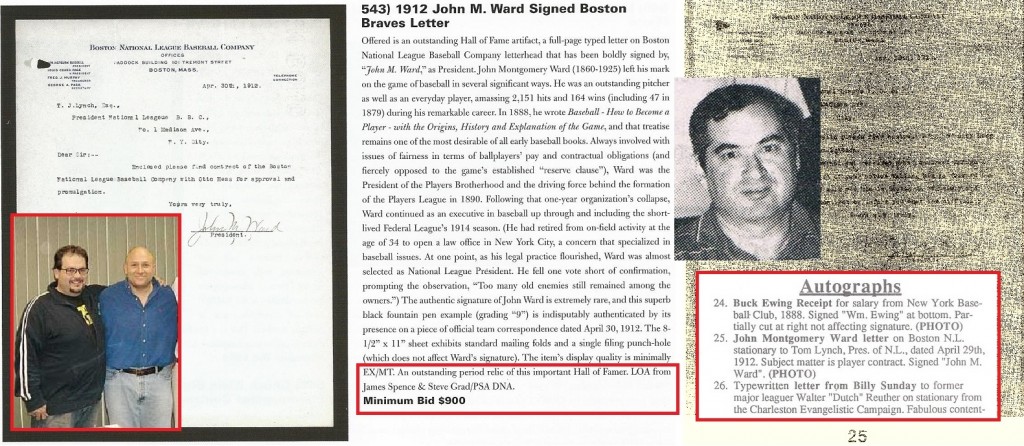
Steve Grad (pictured with Bill Mastro) authenticated the Ward secretarial signature that was pulled from a 2004 Mastro auction as lot 548. Lew Lipset sold a similar bogus Ward letter as genuine in the late 1980's (right).
Another similar Ward letter also featuring a bogus secretarial signature of the rare Hall of Famer was sold as a genuine example by dealer Lew Lipset back in the late 1980’s. But besides the Lipset and Mastro offerings, public sales of similar documents have been few and far between. It wasn’t until 2012 when author Ron Keurajian published, Baseball Hall of Fame Autographs: A Reference Guide, that collectors and auctioneers were provided with a detailed case study of Ward’s handwriting and how it contrasted with the secretarial examples that have surfaced over the decades. In the book Keurajian illustrates three genuine examples of Ward’s signature against one secretarial, all of which he found in the collection at the National Baseball Library in Cooperstown, New York. Keurajian writes, “Just about 100 percent of Ward signatures in the market are forgeries. Many period letters are signed by Ward’s secretary. Secretarial signatures, as seen in Ward 4, deviate greatly from the genuine signature.”
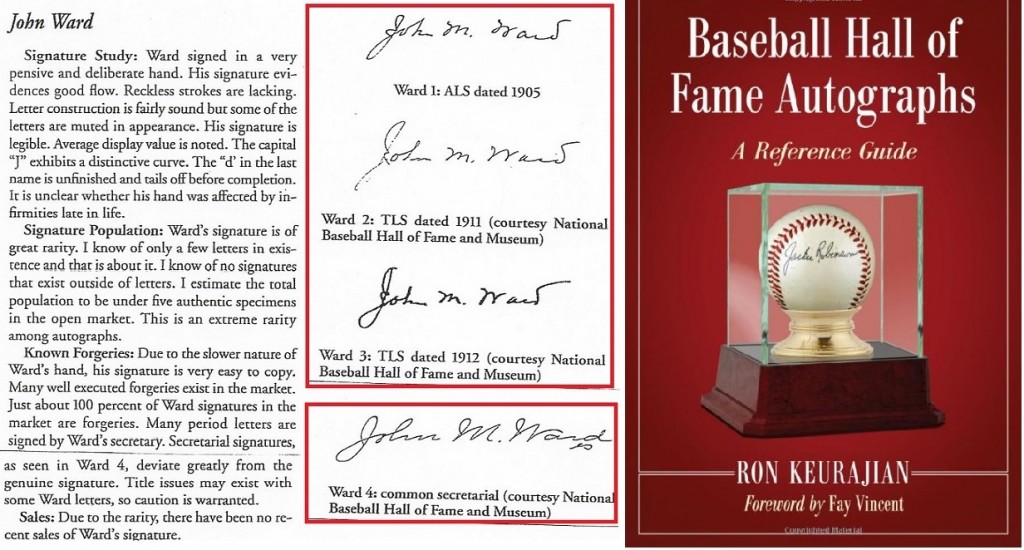
Author Ron Keurajian illustrates genuine John M. Ward signatures with one of the known secretarial examples in his book "Baseball Hall of Fame Autographs: A Reference Guide" (McFarland, 2012).
To arrive at his conclusion Keurajian didn’t have to do much in-depth analysis on the genuine and secretarial examples of Ward’s signature. Keurajian declined to comment on the Ward letter saying the Ward section of his book speaks for itself. The illustrated differences between both versions are so pronounced that even a novice autograph collector can easily see that they were done in different hands. Despite that fact, the Heritage letter was first authenticated by Steve Grad and Jimmy Spence of PSA/DNA when it was offered at the Mastro sale in 2004.

Steve Grad's authentication of the bogus Ward letter made #47 on the HOS "Worst 100 Authentications" list. It was reported that PSA's Kevin Keating was selling the exact same document in 2012, but it was actually another similar Ward document he was offering.
Reminiscent of his now infamous authentication of the $35,000 misspelled Ed Delahanty letter, Grad’s PSA certiftication of the bogus Ward signature was considered so egregious by many autograph aficionados that his gaff made it as #47 on the Hauls of Shame list of the “Worst 100 Authentications of All-Time by PSA/DNA and JSA.” By the time Chris Ivy of Heritage received the bogus document as a consignment he was already aware of the Hauls of Shame report and the previous withdrawal of the letter from the 2004 Mastro sale. Despite that fact, Ivy went ahead and included the letter in the Heritage catalog because it comes with a “Full LOA” from the third-party authentication company.

HOS compared the Heritage secretarial Ward signature against other secretarial and genuine examples.
Then, after posting the Ward letter on the auction house’s online preview, Ivy also became aware of the recent Hauls of Shame report which included a much more detailed comparison of both authentic and secretarial Ward signatures including the signature from Heritage lot. But since Heritage has the PSA/DNA LOA in hand, they apparently feel there’s no reason not to sell the letter. Even though it’s been identified as a forgery in a published hobby reference guide by a recognized expert, Chris and Steve Ivy see no problem with selling the item.
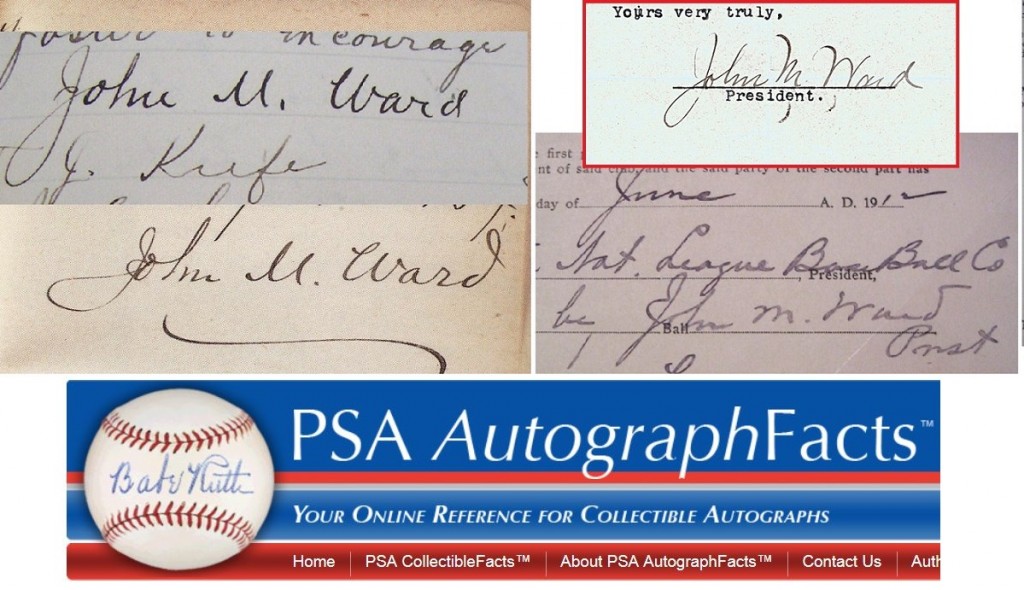
The PSA "Autograph Facts" page featuring John Ward exemplars shows three handwriting samples that illustrate how the Heritage signature is a bogus secretarial. Despite having this information posted on its own website, PSA still issued an LOA.
Even PSA/DNA can’t support its own authentication based on the Ward exemplars it has posted on the “PSA Autograph Facts” page on the company website. The three exemplars PSA presents to the public bear no resemblance whatsoever to the current Ward secretarial signature being sold by Heritage. PSA illustrates one contract signed by Ward in 1912 and two other signatures penned by him in the 1890’s.
Ward’s signature is exceedingly scarce in the marketplace and most of the unimpeachable exemplars of his signature appear on correspondence housed in the Hall of Fame collection and on affidavits filed in a New York City court house. The PSA “Autograph Facts” page only offers a small cross section of Ward’s handwriting and does not even address the secretarial signatures. It is interesting to note that PSA/DNA does not include the secretarial example in Heritage as an authentic example despite the fact it may have been certified by the company twice in the last ten years. We know of only one authentic Ward letter in private hands and that example is believed to have been stolen from the files at the Baseball Hall of Fame (along with the current HA lot).
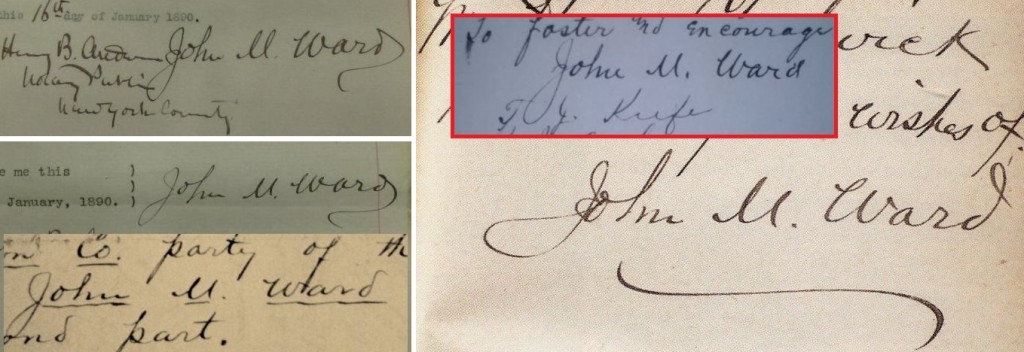
These 19th century examples of Ward's signature are all genuine (clockwise): 1885 Tim Keefe ledger; 1890's book inscribed to Henry Chadwick; 1893 Ward contract (NBL); 1890 court affidavit; 1890 court affidavit.
In examining the authentic handwriting of Ward there is a clear contrast between his signature in the late 19th century and the signatures executed when he was an executive with the Boston Braves. Although you can see the same hand in all of those examples, the earlier versions are more elaborate with larger letter construction. The later versions appear more angular and the signature appears to have been signed with greater speed with an end stroke of the final “d” that almost flies off the page.

Authentic Ward signatures originating from the HOF's Herrmann Papers appear to the left while bogus secretarial examples of the baseball pioneer's signature appear to the right with the Heritage example at the bottom.
The individuals who executed the secretarial versions of Ward’s signature in some cases were not even trying to mimic his real signature, while the example in Heritage shows that there was at least a minimal attempt by a secretary to reproduce what his signature actually looked like. But when displayed side by side next to the authentic documents Ward signed from the August Herrmann Papers Collection, there is no comparison. Ward’s genuine signature is so distinctive and consistent that it is absolutely impossible for a trained eye to mistake one of the secretary signatures for a genuine one. One big Heritage customer we spoke with said, “It’s a joke that Ivy and Heritage have that letter in the auction.”
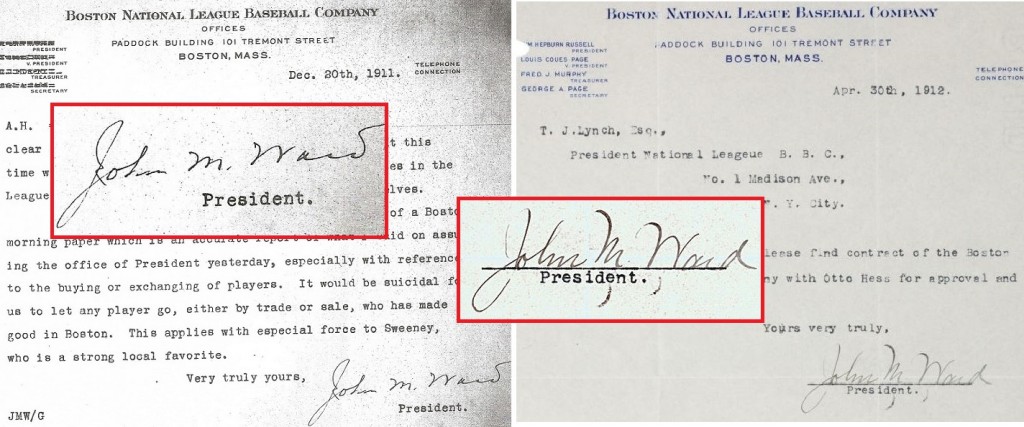
An authentic 1911 letter actually signed by John Ward appears to the left (courtesy NBL) while the Heritage letter (right) bears no resemblance to the authentic Ward.
That, of course, didn’t stop Ivy and Heritage from offering it for public sale in what may be one of the most blatant examples of an auction house knowingly selling a fake autograph. What may be even more troubling is that the alleged experts at PSA and Heritage had access to entire handwritten letters drafted by Ward as well.

This letter was handwritten by John M. Ward (right) and bears his authentic signature. The letter originates from the August Herrmann Papers archive and is believed to have been stolen from the NBL.
In particular, one handwritten letter sent by Ward to August Herrmann and the National Commission in 1905 dealt with his legal representation of the player Jack Taylor who had been accused of gambling on baseball games (the NBL Herrmann archive includes the actual case file for that incident). That letter along with several authentic and secretarial signatures that exist in the archives at Cooperstown should have served as the basis for PSA/DNA to definitively determine that the current Heritage letter was bogus. With the evidence so clearly defined and the Ward signature on the auction letter so starkly contrasting the real ones, how could Steve Grad and PSA still issue a letter of authenticity? How does Grad explain his authentication with Jimmy Spence in 2004 when Bill Mastro withdrew the letter from his sale because even he knew it was a fake? Why would PSA knowingly allow the current sale a bogus item that had already been pulled from a previous auction?

Jimmy Spence and Pawn Stars authenticator Steve Grad (center) certified the bogus Ward letter genuine in 2004 but even Bill Mastro (right) knew it was a fake and pulled it from his sale.
The answer just might lie in the identity of the Heritage consignor or a former owner of the letter. It might also be because one of the PSA/DNA authenticators was recently peddling another bogus Ward letter addressed to Thomas Lynch in 1912. Sources indicate that PSA/DNA authenticator Kevin Keating of Alexandria, Virginia, offered the other bogus Ward document to a collector for $50,000. The signature on Keating’s document is the same style secretary signature as the Heritage lot.

PSA authenticator Kevin Keating (right) offered a collector another bogus Ward letter (left) written to the NL president. The secretary's signature matches the Heritage letter.
Keating has been listed as a member of PSA’s “autograph authentication team” on the company’s LOA’s since he joined Joe Orlando and Co. back in 2009 and in an article published in PSA’s Sports Market Report (SMR), Keating expressed his pride in working for PSA saying, “The proliferation of auction houses would absolutely not be possible if it weren’t for a company like PSA. They have enabled then to be in business. They can lean on a company like PSA so they can filter out the bad items.” But filtering out a bad item is not what’s happened at Heritage with the bogus Ward letter. What appears to have happened is that a counterfeit item may have received the blessing of PSA because an authenticator of the company owns a similar forgery, in this case Keating. The offering of the other bogus Ward letter and its ties to Keating, who tried to dupe a fellow collector in a private transaction, make a mockery of other statements made by Keating on the PSA website. Said Keating, “PSA has undoubtedly made it much more difficult for forgers to operate successfully. PSA is a filter system that keeps the bad stuff out of the hobby.”
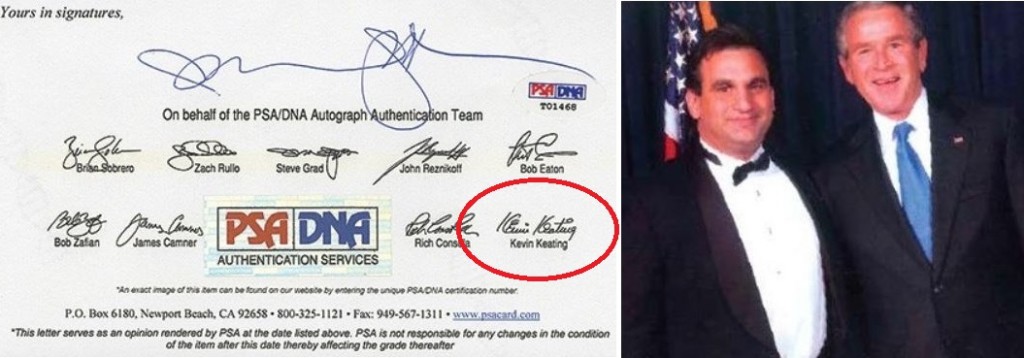
The PSA letters of authenticity include the facsimile signature of alleged experts Steve Grad and Kevin Keating (right).
But it appears that Keating and Grad won’t keep out the bad stuff that PSA insiders have (or had) a financial interest in. In offering the other Ward letter last year and in writing an LOA for the letter in Heritage’s current sale both Keating and Grad have exposed themselves as incompetent authenticators who either cannot catch a common secretarial signature of one of the rarest Hall of Famer autographs, or are committing an outright fraud upon the hobby by knowingly authenticating a fake item. It appears that Chris Ivy and Heritage could care less if the item is genuine or bogus—all they require is the PSA letter.
The government’s plea agreement with Bill Mastro in the United States v. Mastro stipulates that Mastro cooperate with prosecutors and offer whatever information he has that will assist their cases against his co-defendants Doug Allen, Mark Theotikos and other parties in the memorabilia industry. Sources indicate that the government has also been investigating PSA and its principals including David Hall and Joe Orlando and if Mastro were to sing to the Feds and rat-out former colleagues including Steve Grad, Jimmy Spence, Kevin Keating and John Reznikoff, in relation to incidents similar to the Ward LOA, the authentication giant could face further scrutiny.

Mastro withdrew the bogus Ward letter from a 2004 sale (left) but Chris & Steve Ivy of Heritage are selling it anyway.
When Bill Mastro offered the same Ward letter in 2004 he described it as being “indisputably authenticated by its presence on a piece of official team correspondence dated April 30, 1912.” But when executed by a secretary, a rarity that could command $25,000 (or $50k per Keating) suddenly plummets in value. Mastro started out the letter at $900 and the Legendary-Mastro website lists the last bid on the letter in 2004 at $1,139, roughly 1/25 of the value of a genuine Ward letter. The Heritage Ward letter opened at $1,000 and has received 6 bids to reach only $1,700 for its current high bid.
When Mastro published his auction results in 2004, the Ward letter appeared as lot 543 and was identified as “Withdrawn.” Now, a decade later, the bogus rarity has resurfaced with its PSA/DNA letter at an auction house like Heritage functioning as an accomplice in the distribution of yet another fake into the hobby. One collector we spoke with who requested anonymity told us, “This letter in the Heritage auction just exposes what these companies like PSA do, they cert bogus and questionable autographs for their friends and auction house buddies.” PSA’s so-called experts also offer $50,000 fakes for sale to unsuspecting collectors. So much for that filter system to keep bad stuff out of the hobby.
We asked Chris Ivy why his auction house is selling the fake Ward letter despite the public information indicating it is a forgery and he disputed our claim that the letter was withdrawn from the Mastro sale. Ivy said, “The letter in question sold for $1,139 in the MastroNet Winter 2004 auction, at which time it was authenticated by James Spence and Steve Grad. I am not certain what happened to that letter of authenticity, but the one that currently accompanies it was issued by PSA/DNA on April 10, 2014, certification number V02859. That being said, no human is infallible and if this letter was issued in error the lot will be removed from auction. We will undertake an investigation of your claims.” Ivy did not offer any information regarding the provenance of the Ward letter but despite his company’s checkered past regarding authenticity issues he added, “Heritage would never sell an item which we do not believe to be genuine.”
We also contacted the offices of Quality Autographs to ask Kevin Keating why he was peddling the other bogus Ward for $50,000 and why he would put his name on a PSA LOA that falsely claims the Heritage letter is genuine? A representative said Keating was traveling and he did not respond to our inquiry.

Joe Orlando's PSA/DNA crew headed by Steve Grad (right) certified the Ward fake as genuine with its own cert code "V02859". The fake also got by HA employee Mike Gutierrez (center) who is a past PSA and current JSA "expert."
While its difficult to get collectors or dealers to criticize Ivy and Heritage publicly for fear they will be banned from bidding in future HA sales one collector summed up of the feelings of most when he told us, “Is he (Ivy) a criminal mastermind or does he lack the mental acuity required for such a nefarious title? The time tested adage of “Fool me once, shame on you – fool me twice shame on me, would normally apply in this case, but never before has there been a need to figure out who to blame when the count reaches ‘fool me 20 times’?”
Although collectors and hobbyists regularly accuse auctioneers like Ivy of knowingly selling questionable items and outright fakes, the auctioneers can always fall back and lay the blame on the authentication company issuing the LOA. That’s an auctioneer move taken right out of the Bill Mastro playbook.
The offering of the PSA-certified Ward letter at Heritage is a perfect case study to illustrate what the third-party authentication company has been banking on all along since Bill Mastro helped put the system into place over fifteen years ago: Have the LOA not guarantee anything and let everything else boil down to a matter of opinion, even when the evidence is overwhelming that an item is a forgery. As long as the PSA/DNA LOA has all of the facsimile signatures of the alleged experts, that’s all that matters. What the third-party giant has illustrated with the Ward letter is how effective their formula is in facilitating the execution of the perfect hobby crime.
Or maybe it’s just the next best perfect crime in line after someone successfully smuggled all of these Ward letters out of the National Baseball Library in Cooperstown. Heritage and PSA are all too familiar with that, too.
